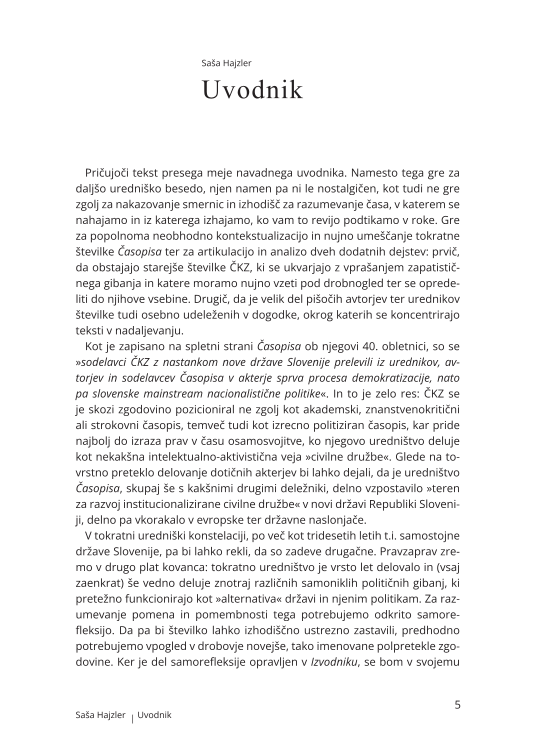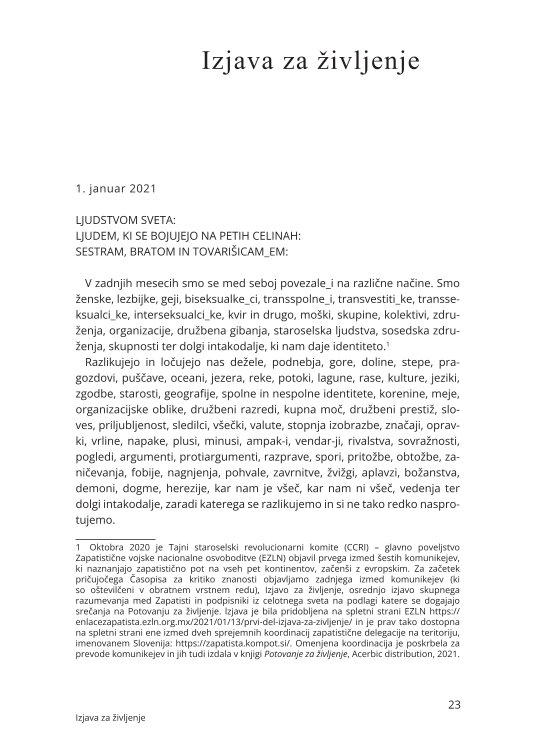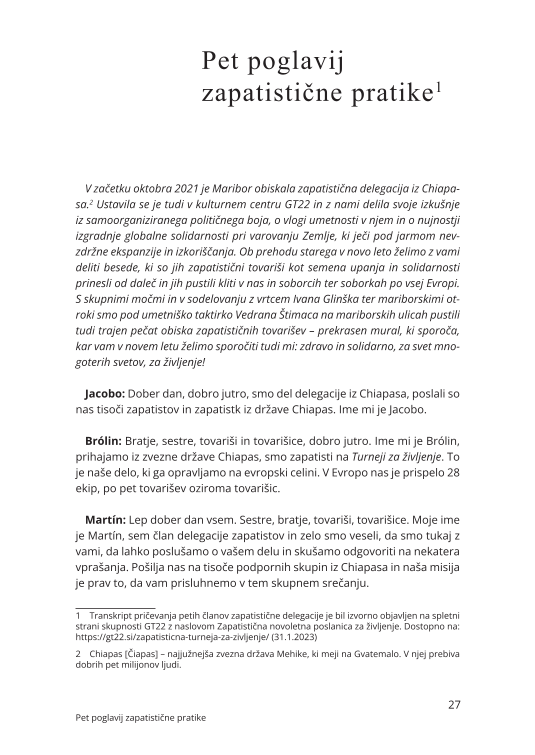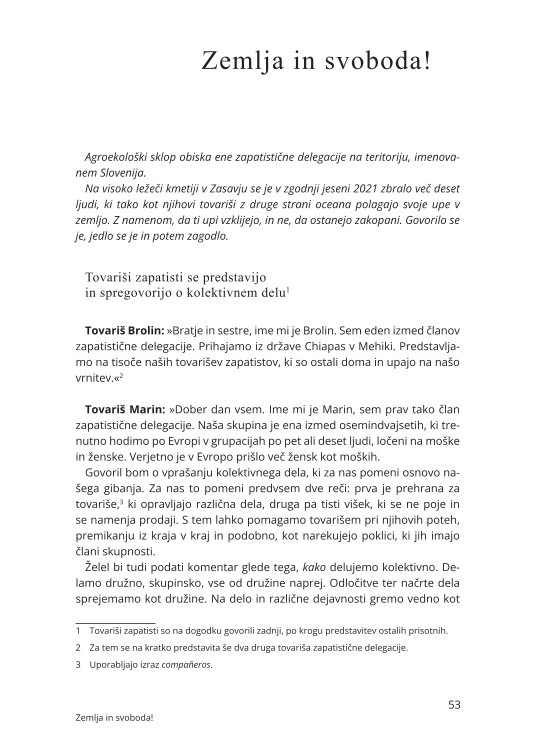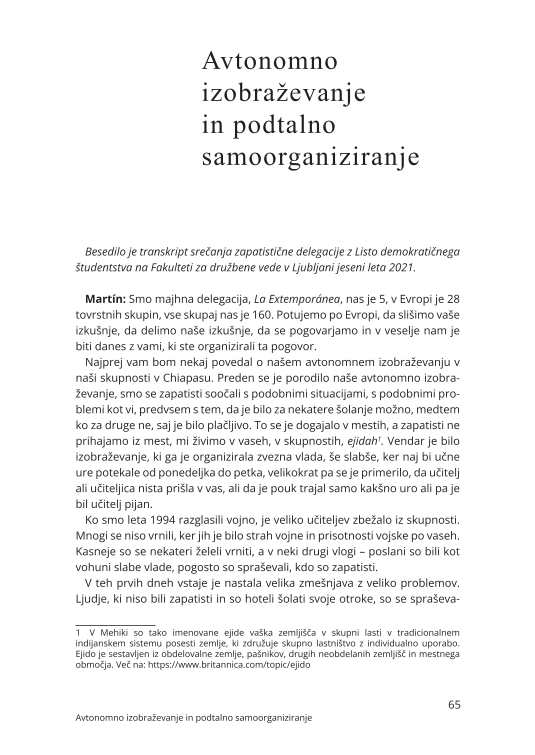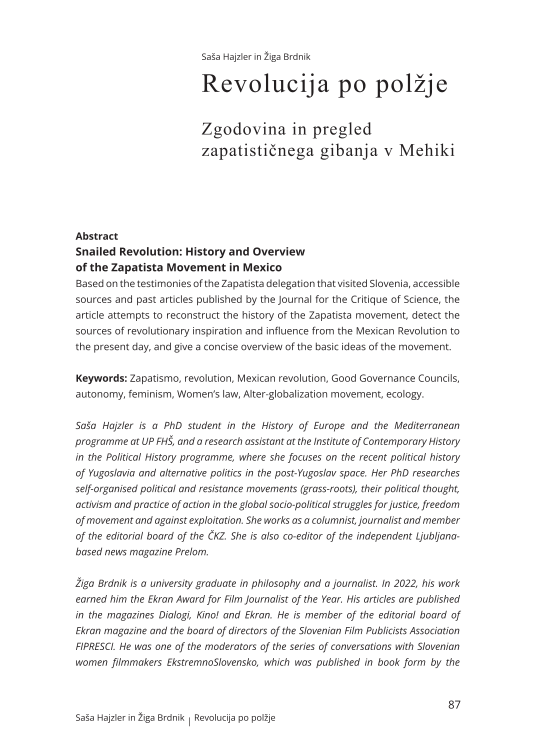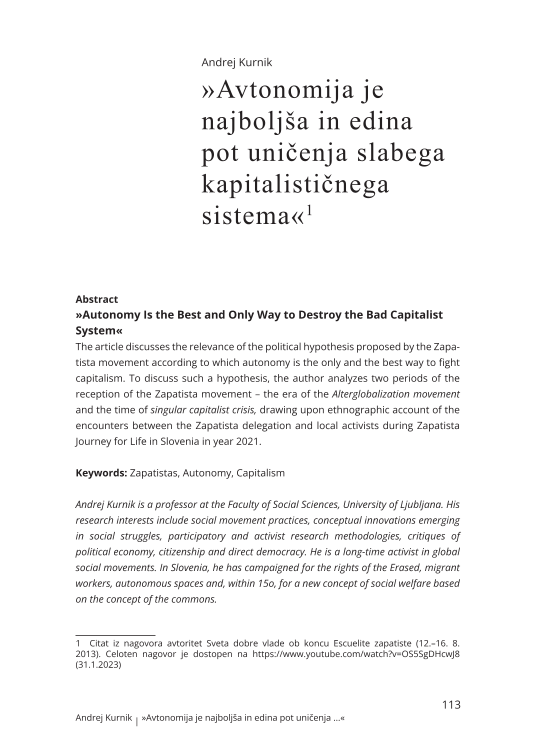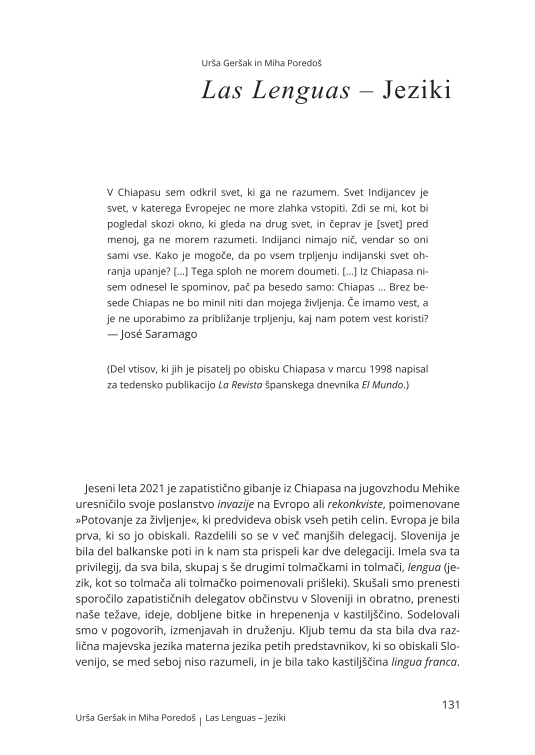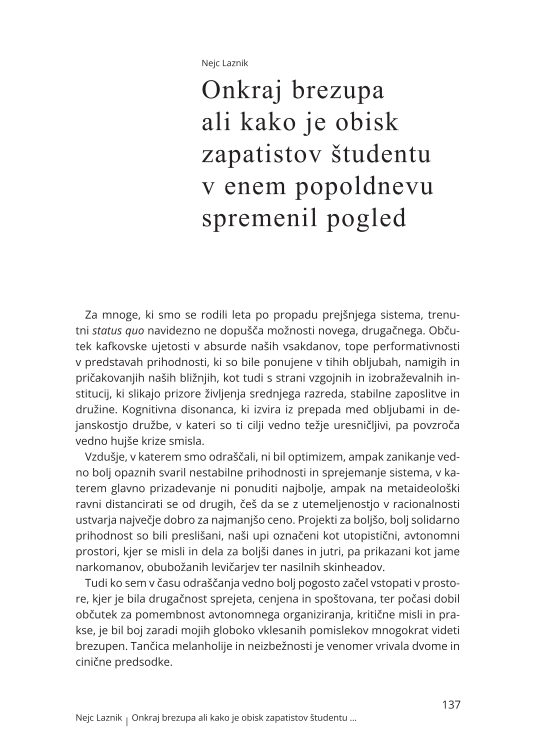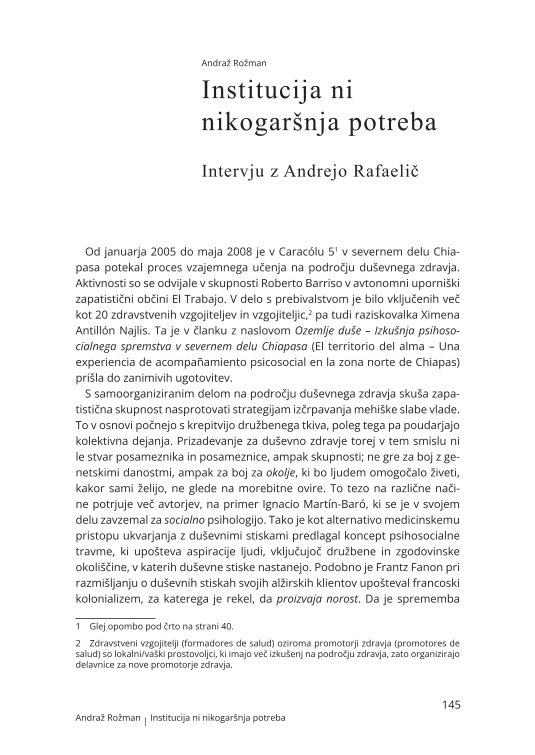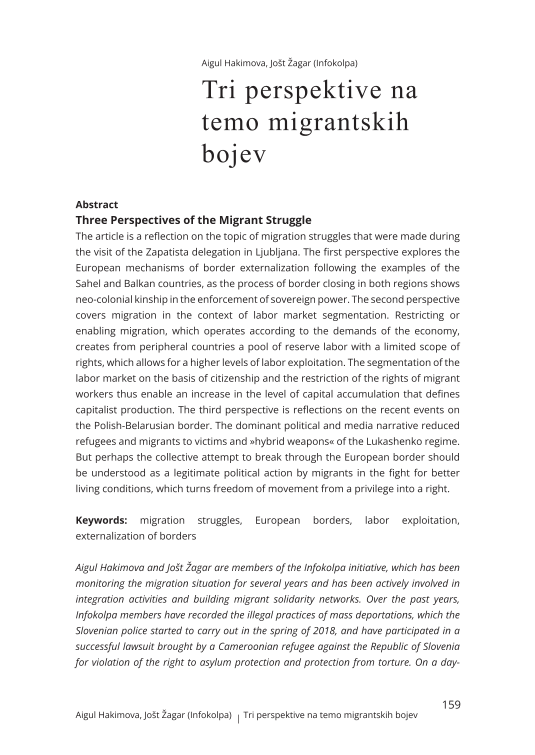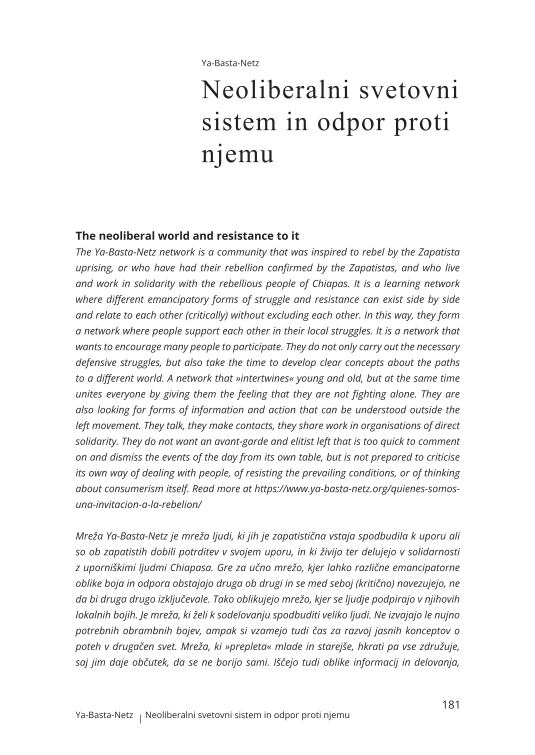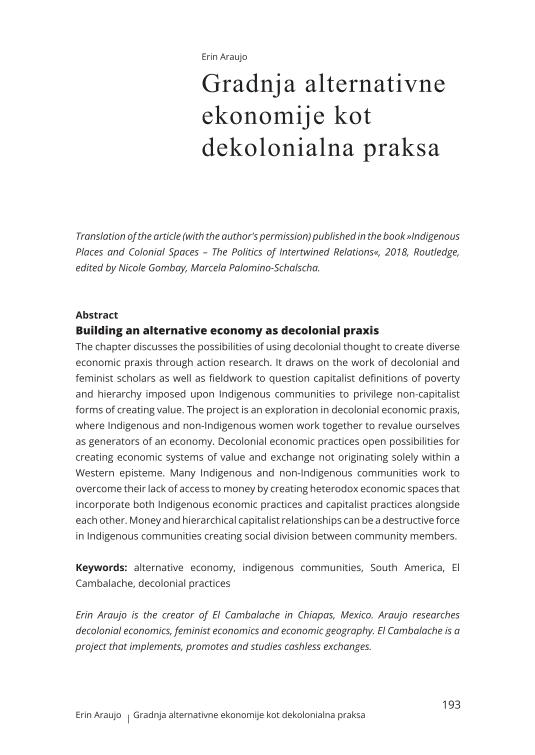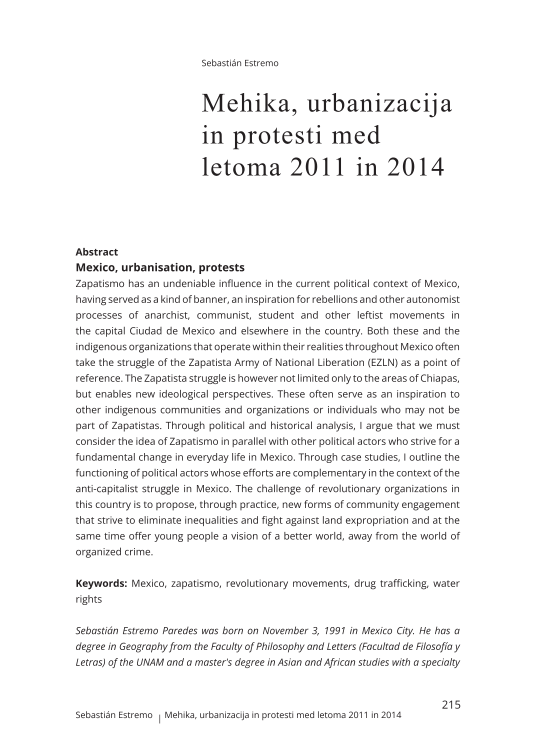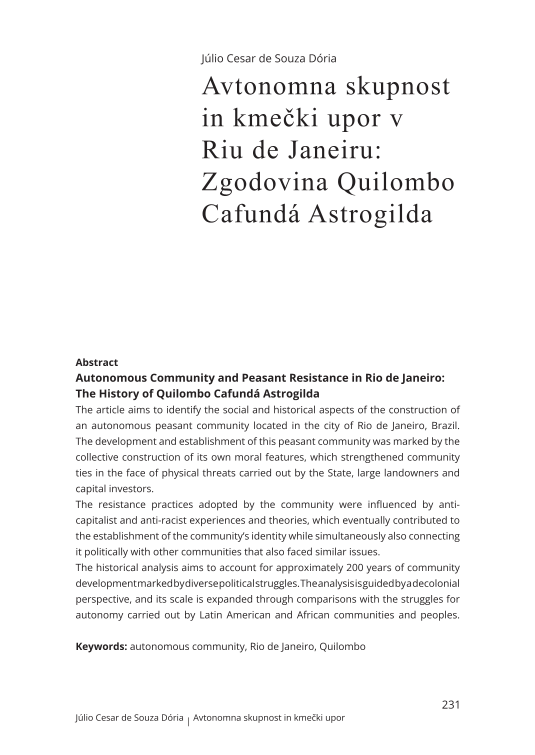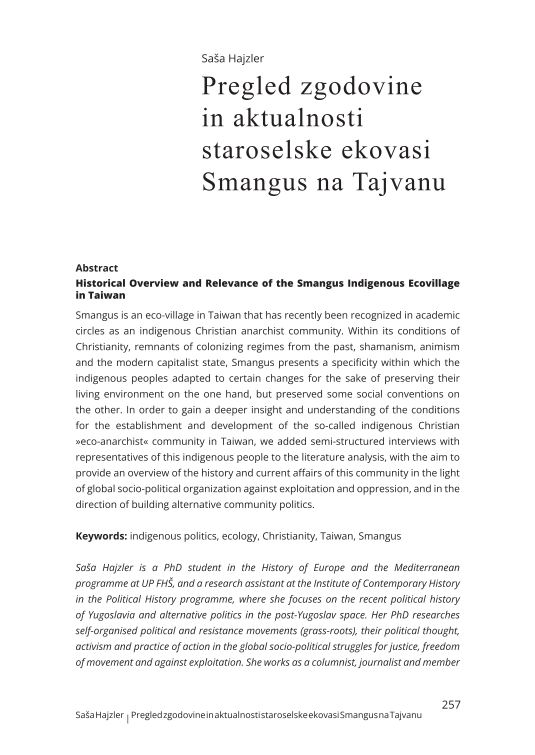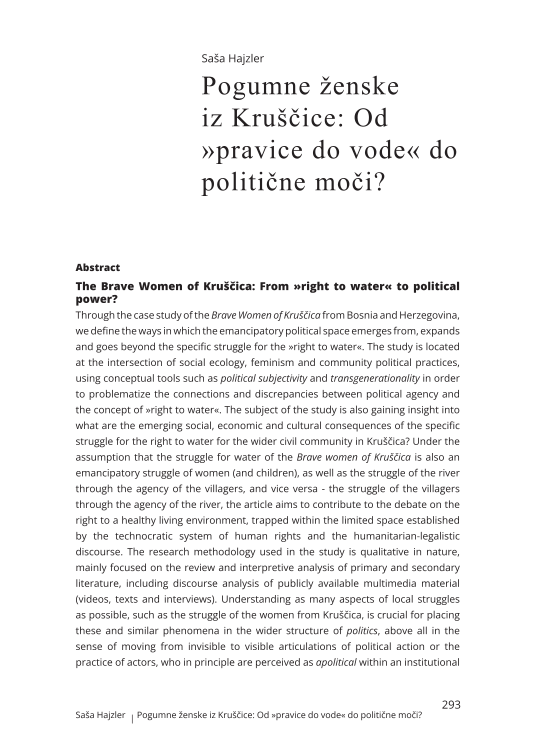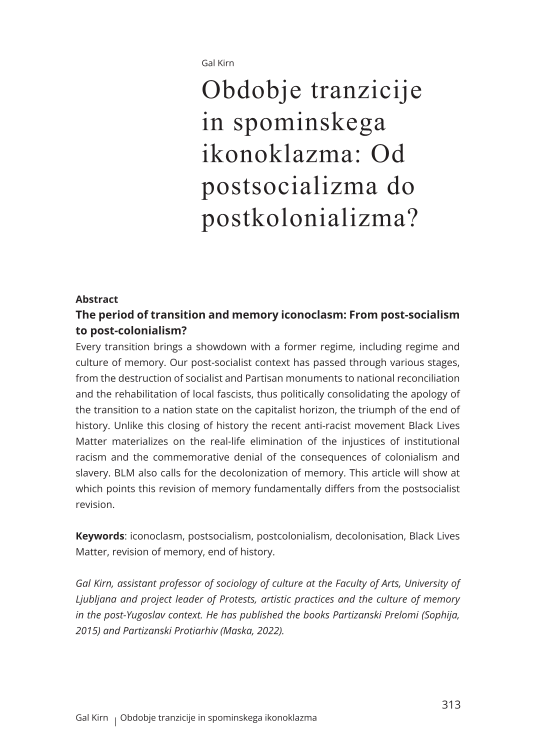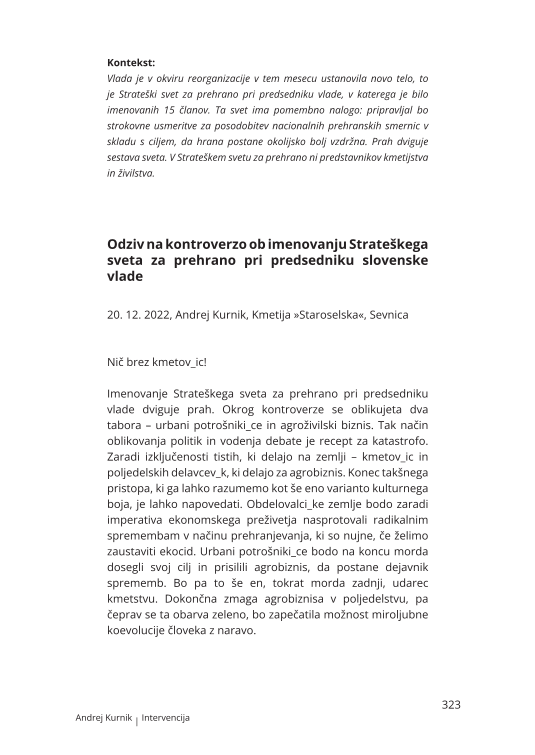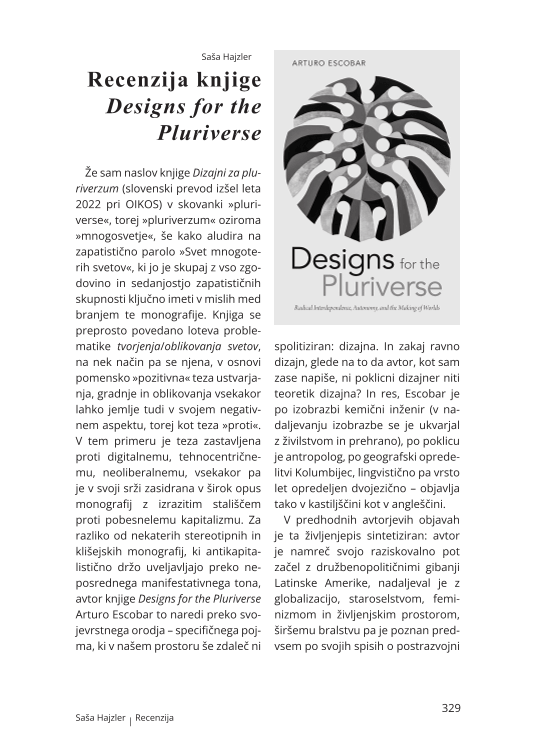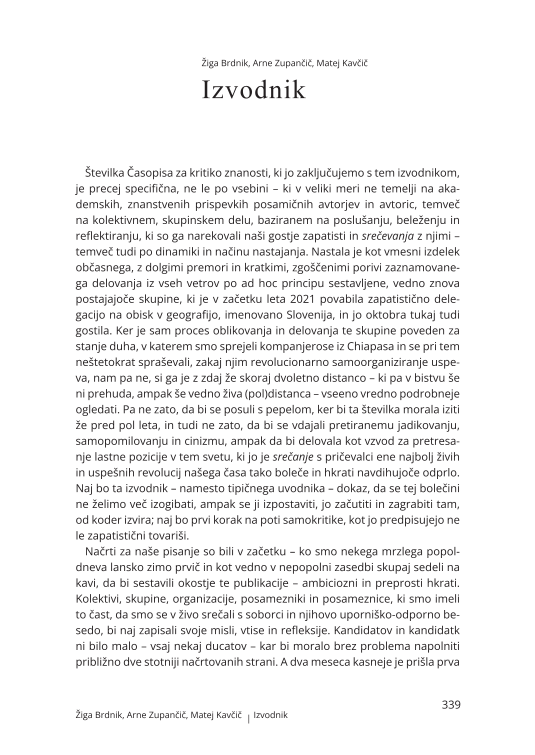Pričujoči tekst presega meje navadnega uvodnika. Namesto tega gre za daljšo uredniško besedo, njen namen pa ni le nostalgičen, kot tudi ne gre zgolj za nakazovanje smernic in izhodišč za razumevanje časa, v katerem se nahajamo in iz katerega izhajamo, ko vam to revijo podtikamo v roke. Gre za popolnoma neobhodno kontekstualizacijo in nujno umeščanje tokratne številke Časopisa ter za artikulacijo in analizo dveh dodatnih dejstev: prvič, da obstajajo starejše številke ČKZ, ki se ukvarjajo z vprašanjem zapatističnega gibanja in katere moramo nujno vzeti pod drobnogled ter se opredeliti do njihove vsebine. Drugič, da je velik del pišočih avtorjev ter urednikov številke tudi osebno udeleženih v dogodke, okrog katerih se koncentrirajo teksti v nadaljevanju.
1. januar 2021
LJUDSTVOM SVETA:
LJUDEM, KI SE BOJUJEJO NA PETIH CELINAH:
SESTRAM, BRATOM IN TOVARIŠICAM_EM:
V zadnjih mesecih smo se med seboj povezale_i na različne načine. Smo ženske, lezbijke, geji, biseksualke_ci, transspolne_i, transvestiti_ke, transseksualci_ke, interseksualci_ke, kvir in drugo, moški, skupine, kolektivi, združenja, organizacije, družbena gibanja, staroselska ljudstva, sosedska združenja, skupnosti ter dolgi intakodalje, ki nam daje identiteto.
Razlikujejo in ločujejo nas dežele, podnebja, gore, doline, stepe, pragozdovi, puščave, oceani, jezera, reke, potoki, lagune, rase, kulture, jeziki, zgodbe, starosti, geografije, spolne in nespolne identitete, korenine, meje, organizacijske oblike, družbeni razredi, kupna moč, družbeni prestiž, sloves, priljubljenost, sledilci, všečki, valute, stopnja izobrazbe, značaji, opravki, vrline, napake, plusi, minusi, ampak-i, vendar-ji, rivalstva, sovražnosti, pogledi, argumenti, protiargumenti, razprave, spori, pritožbe, obtožbe, zaničevanja, fobije, nagnjenja, pohvale, zavrnitve, žvižgi, aplavzi, božanstva, demoni, dogme, herezije, kar nam je všeč, kar nam ni všeč, vedenja ter dolgi intakodalje, zaradi katerega se razlikujemo in si ne tako redko nasprotujemo.
V začetku oktobra 2021 je Maribor obiskala zapatistična delegacija iz Chiapasa. Ustavila se je tudi v kulturnem centru GT22 in z nami delila svoje izkušnje iz samoorganiziranega političnega boja, o vlogi umetnosti v njem in o nujnostji izgradnje globalne solidarnosti pri varovanju Zemlje, ki ječi pod jarmom nevzdržne ekspanzije in izkoriščanja. Ob prehodu starega v novo leto želimo z vami deliti besede, ki so jih zapatistični tovariši kot semena upanja in solidarnosti prinesli od daleč in jih pustili kliti v nas in soborcih ter soborkah po vsej Evropi. S skupnimi močmi in v sodelovanju z vrtcem Ivana Glinška ter mariborskimi otroki smo pod umetniško taktirko Vedrana Štimaca na mariborskih ulicah pustili tudi trajen pečat obiska zapatističnih tovarišev – prekrasen mural, ki sporoča, kar vam v novem letu želimo sporočiti tudi mi: zdravo in solidarno, za svet mnogoterih svetov, za življenje!
Agroekološki sklop obiska ene zapatistične delegacije na teritoriju, imenovanem Slovenija.
Na visoko ležeči kmetiji v Zasavju se je v zgodnji jeseni 2021 zbralo več deset ljudi, ki tako kot njihovi tovariši z druge strani oceana polagajo svoje upe v zemljo. Z namenom, da ti upi vzklijejo, in ne, da ostanejo zakopani. Govorilo se je, jedlo se je in potem zagodlo.
Tovariši zapatisti se predstavijo in spregovorijo o kolektivnem delu
Besedilo je transkript srečanja zapatistične delegacije z Listo demokratičnega študentstva na Fakulteti za družbene vede v Ljubljani jeseni leta 2021.
Martín: Smo majhna delegacija, La Extemporánea, nas je 5, v Evropi je 28 tovrstnih skupin, vse skupaj nas je 160. Potujemo po Evropi, da slišimo vaše izkušnje, da delimo naše izkušnje, da se pogovarjamo in v veselje nam je biti danes z vami, ki ste organizirali ta pogovor.
Najprej vam bom nekaj povedal o našem avtonomnem izobraževanju v naši skupnosti v Chiapasu. Preden se je porodilo naše avtonomno izobraževanje, smo se zapatisti soočali s podobnimi situacijami, s podobnimi problemi kot vi, predvsem s tem, da je bilo za nekatere šolanje možno, medtem ko za druge ne, saj je bilo plačljivo. To se je dogajalo v mestih, a zapatisti ne prihajamo iz mest, mi živimo v vaseh, v skupnostih, ejidah. Vendar je bilo izobraževanje, ki ga je organizirala zvezna vlada, še slabše, ker naj bi učne ure potekale od ponedeljka do petka, velikokrat pa se je primerilo, da učitelj ali učiteljica nista prišla v vas, ali da je pouk trajal samo kakšno uro ali pa je bil učitelj pijan.
Based on the testimonies of the Zapatista delegation that visited Slovenia, accessible sources and past articles published by the Journal for the Critique of Science, the article attempts to reconstruct the history of the Zapatista movement, detect the sources of revolutionary inspiration and influence from the Mexican Revolution to the present day, and give a concise overview of the basic ideas of the movement.
The article discusses the relevance of the political hypothesis proposed by the Zapatista movement according to which autonomy is the only and the best way to fight capitalism. To discuss such a hypothesis, the author analyzes two periods of the reception of the Zapatista movement – the era of the Alterglobalization movement and the time of singular capitalist crisis, drawing upon ethnographic account of the encounters between the Zapatista delegation and local activists during Zapatista Journey for Life in Slovenia in year 2021.
Jeseni leta 2021 je zapatistično gibanje iz Chiapasa na jugovzhodu Mehike uresničilo svoje poslanstvo invazije na Evropo ali rekonkviste, poimenovane »Potovanje za življenje«, ki predvideva obisk vseh petih celin. Evropa je bila prva, ki so jo obiskali. Razdelili so se v več manjših delegacij. Slovenija je bila del balkanske poti in k nam sta prispeli kar dve delegaciji. Imela sva ta privilegij, da sva bila, skupaj s še drugimi tolmačkami in tolmači, lengua (jezik, kot so tolmača ali tolmačko poimenovali prišleki). Skušali smo prenesti sporočilo zapatističnih delegatov občinstvu v Sloveniji in obratno, prenesti naše težave, ideje, dobljene bitke in hrepenenja v kastiljščino. Sodelovali smo v pogovorih, izmenjavah in druženju. Kljub temu da sta bila dva različna majevska jezika materna jezika petih predstavnikov, ki so obiskali Slovenijo, se med seboj niso razumeli, in je bila tako kastiljščina lingua franca. Beležili so si vse, kar so slišali, da bi naše izkušnje nato prenesli v svoje skupnosti in jim natančno naslikali borbe svojih gostiteljev v Evropi.
Za mnoge, ki smo se rodili leta po propadu prejšnjega sistema, trenutni status quo navidezno ne dopušča možnosti novega, drugačnega. Občutek kafkovske ujetosti v absurde naših vsakdanov, tope performativnosti v predstavah prihodnosti, ki so bile ponujene v tihih obljubah, namigih in pričakovanjih naših bližnjih, kot tudi s strani vzgojnih in izobraževalnih institucij, ki slikajo prizore življenja srednjega razreda, stabilne zaposlitve in družine. Kognitivna disonanca, ki izvira iz prepada med obljubami in dejanskostjo družbe, v kateri so ti cilji vedno težje uresničljivi, pa povzroča vedno hujše krize smisla.
Od januarja 2005 do maja 2008 je v Caracólu 5 v severnem delu Chiapasa potekal proces vzajemnega učenja na področju duševnega zdravja. Aktivnosti so se odvijale v skupnosti Roberto Barriso v avtonomni uporniški zapatistični občini El Trabajo. V delo s prebivalstvom je bilo vključenih več kot 20 zdravstvenih vzgojiteljev in vzgojiteljic, pa tudi raziskovalka Ximena Antillón Najlis. Ta je v članku z naslovom Ozemlje duše – Izkušnja psihosocialnega spremstva v severnem delu Chiapasa (El territorio del alma – Una experiencia de acompañamiento psicosocial en la zona norte de Chiapas) prišla do zanimivih ugotovitev.
The article is a reflection on the topic of migration struggles that were made during the visit of the Zapatista delegation in Ljubljana. The first perspective explores the European mechanisms of border externalization following the examples of the Sahel and Balkan countries, as the process of border closing in both regions shows neo-colonial kinship in the enforcement of sovereign power. The second perspective covers migration in the context of labor market segmentation. Restricting or enabling migration, which operates according to the demands of the economy, creates from peripheral countries a pool of reserve labor with a limited scope of rights, which allows for a higher levels of labor exploitation. The segmentation of the labor market on the basis of citizenship and the restriction of the rights of migrant workers thus enable an increase in the level of capital accumulation that defines capitalist production. The third perspective is reflections on the recent events on the Polish-Belarusian border. The dominant political and media narrative reduced refugees and migrants to victims and »hybrid weapons« of the Lukashenko regime. But perhaps the collective attempt to break through the European border should be understood as a legitimate political action by migrants in the fight for better living conditions, which turns freedom of movement from a privilege into a right.
The Ya-Basta-Netz network is a community that was inspired to rebel by the Zapatista uprising, or who have had their rebellion confirmed by the Zapatistas, and who live and work in solidarity with the rebellious people of Chiapas. It is a learning network where different emancipatory forms of struggle and resistance can exist side by side and relate to each other (critically) without excluding each other. In this way, they form a network where people support each other in their local struggles. It is a network that wants to encourage many people to participate. They do not only carry out the necessary defensive struggles, but also take the time to develop clear concepts about the paths to a different world. A network that »intertwines« young and old, but at the same time unites everyone by giving them the feeling that they are not fighting alone. They are also looking for forms of information and action that can be understood outside the left movement. They talk, they make contacts, they share work in organisations of direct solidarity. They do not want an avant-garde and elitist left that is too quick to comment on and dismiss the events of the day from its own table, but is not prepared to criticise its own way of dealing with people, of resisting the prevailing conditions, or of thinking about consumerism itself. Read more at https://www.ya-basta-netz.org/quienes-somos-una-invitacion-a-la-rebelion/
The chapter discusses the possibilities of using decolonial thought to create diverse economic praxis through action research. It draws on the work of decolonial and feminist scholars as well as fieldwork to question capitalist definitions of poverty and hierarchy imposed upon Indigenous communities to privilege non-capitalist forms of creating value. The project is an exploration in decolonial economic praxis, where Indigenous and non-Indigenous women work together to revalue ourselves as generators of an economy. Decolonial economic practices open possibilities for creating economic systems of value and exchange not originating solely within a Western episteme. Many Indigenous and non-Indigenous communities work to overcome their lack of access to money by creating heterodox economic spaces that incorporate both Indigenous economic practices and capitalist practices alongside each other. Money and hierarchical capitalist relationships can be a destructive force in Indigenous communities creating social division between community members.
Zapatismo has an undeniable influence in the current political context of Mexico, having served as a kind of banner, an inspiration for rebellions and other autonomist processes of anarchist, communist, student and other leftist movements in the capital Ciudad de Mexico and elsewhere in the country. Both these and the indigenous organizations that operate within their realities throughout Mexico often take the struggle of the Zapatista Army of National Liberation (EZLN) as a point of reference. The Zapatista struggle is however not limited only to the areas of Chiapas, but enables new ideological perspectives. These often serve as an inspiration to other indigenous communities and organizations or individuals who may not be part of Zapatistas. Through political and historical analysis, I argue that we must consider the idea of Zapatismo in parallel with other political actors who strive for a fundamental change in everyday life in Mexico. Through case studies, I outline the functioning of political actors whose efforts are complementary in the context of the anti-capitalist struggle in Mexico. The challenge of revolutionary organizations in this country is to propose, through practice, new forms of community engagement that strive to eliminate inequalities and fight against land expropriation and at the same time offer young people a vision of a better world, away from the world of organized crime.
The article aims to identify the social and historical aspects of the construction of an autonomous peasant community located in the city of Rio de Janeiro, Brazil. The development and establishment of this peasant community was marked by the collective construction of its own moral features, which strengthened community ties in the face of physical threats carried out by the State, large landowners and capital investors.
The resistance practices adopted by the community were influenced by anti-capitalist and anti-racist experiences and theories, which eventually contributed to the establishment of the community’s identity while simultaneously also connecting it politically with other communities that also faced similar issues.
The historical analysis aims to account for approximately 200 years of community development marked by diverse political struggles. The analysis is guided by a decolonial perspective, and its scale is expanded through comparisons with the struggles for autonomy carried out by Latin American and African communities and peoples.
Smangus is an eco-village in Taiwan that has recently been recognized in academic circles as an indigenous Christian anarchist community. Within its conditions of Christianity, remnants of colonizing regimes from the past, shamanism, animism and the modern capitalist state, Smangus presents a specificity within which the indigenous peoples adapted to certain changes for the sake of preserving their living environment on the one hand, but preserved some social conventions on the other. In order to gain a deeper insight and understanding of the conditions for the establishment and development of the so-called indigenous Christian »eco-anarchist« community in Taiwan, we added semi-structured interviews with representatives of this indigenous people to the literature analysis, with the aim to provide an overview of the history and current affairs of this community in the light of global socio-political organization against exploitation and oppression, and in the direction of building alternative community politics.
Through the case study of the Brave Women of Kruščica from Bosnia and Herzegovina, we define the ways in which the emancipatory political space emerges from, expands and goes beyond the specific struggle for the »right to water«. The study is located at the intersection of social ecology, feminism and community political practices, using conceptual tools such as political subjectivity and transgenerationality in order to problematize the connections and discrepancies between political agency and the concept of »right to water«. The subject of the study is also gaining insight into what are the emerging social, economic and cultural consequences of the specific struggle for the right to water for the wider civil community in Kruščica? Under the assumption that the struggle for water of the Brave women of Kruščica is also an emancipatory struggle of women (and children), as well as the struggle of the river through the agency of the villagers, and vice versa - the struggle of the villagers through the agency of the river, the article aims to contribute to the debate on the right to a healthy living environment, trapped within the limited space established by the technocratic system of human rights and the humanitarian-legalistic discourse. The research methodology used in the study is qualitative in nature, mainly focused on the review and interpretive analysis of primary and secondary literature, including discourse analysis of publicly available multimedia material (videos, texts and interviews). Understanding as many aspects of local struggles as possible, such as the struggle of the women from Kruščica, is crucial for placing these and similar phenomena in the wider structure of politics, above all in the sense of moving from invisible to visible articulations of political action or the practice of actors, who in principle are perceived as apolitical within an institutional perception of politics. Ultimately, such studies serve as a tool to reveal and explain power relations that may be hidden, but are inherently responsible for the creation of political narratives, identities and, last but not least, rights.
Every transition brings a showdown with a former regime, including regime and culture of memory. Our post-socialist context has passed through various stages, from the destruction of socialist and Partisan monuments to national reconciliation and the rehabilitation of local fascists, thus politically consolidating the apology of the transition to a nation state on the capitalist horizon, the triumph of the end of history. Unlike this closing of history the recent anti-racist movement Black Lives Matter materializes on the real-life elimination of the injustices of institutional racism and the commemorative denial of the consequences of colonialism and slavery. BLM also calls for the decolonization of memory. This article will show at which points this revision of memory fundamentally differs from the postsocialist revision.
Kontekst:
Vlada je v okviru reorganizacije v tem mesecu ustanovila novo telo, to je Strateški svet za prehrano pri predsedniku vlade, v katerega je bilo imenovanih 15 članov. Ta svet ima pomembno nalogo: pripravljal bo strokovne usmeritve za posodobitev nacionalnih prehranskih smernic v skladu s ciljem, da hrana postane okolijsko bolj vzdržna. Prah dviguje sestava sveta. V Strateškem svetu za prehrano ni predstavnikov kmetijstva in živilstva.
Odziv na kontroverzo ob imenovanju Strateškega sveta za prehrano pri predsedniku slovenske vlade
20. 12. 2022, Andrej Kurnik, Kmetija »Staroselska«, Sevnica
Nič brez kmetov_ic!
Že sam naslov knjige Dizajni za pluriverzum (slovenski prevod izšel leta 2022 pri OIKOS) v skovanki »pluriverse«, torej »pluriverzum« oziroma »mnogosvetje«, še kako aludira na zapatistično parolo »Svet mnogoterih svetov«, ki jo je skupaj z vso zgodovino in sedanjostjo zapatističnih skupnosti ključno imeti v mislih med branjem te monografije. Knjiga se preprosto povedano loteva problematike tvorjenja/oblikovanja svetov, na nek način pa se njena, v osnovi pomensko »pozitivna« teza ustvarjanja, gradnje in oblikovanja vsekakor lahko jemlje tudi v svojem negativnem aspektu, torej kot teza »proti«. V tem primeru je teza zastavljena proti digitalnemu, tehnocentričnemu, neoliberalnemu, vsekakor pa je v svoji srži zasidrana v širok opus monografij z izrazitim stališčem proti pobesnelemu kapitalizmu. Za razliko od nekaterih stereotipnih in klišejskih monografij, ki antikapitalistično držo uveljavljajo preko neposrednega manifestativnega tona, avtor knjige Designs for the Pluriverse Arturo Escobar to naredi preko svojevrstnega orodja – specifičnega pojma, ki v našem prostoru še zdaleč ni spolitiziran: dizajna. In zakaj ravno dizajn, glede na to da avtor, kot sam zase napiše, ni poklicni dizajner niti teoretik dizajna? In res, Escobar je po izobrazbi kemični inženir (v nadaljevanju izobrazbe se je ukvarjal z živilstvom in prehrano), po poklicu je antropolog, po geografski opredelitvi Kolumbijec, lingvistično pa vrsto let opredeljen dvojezično – objavlja tako v kastiljščini kot v angleščini.
Številka Časopisa za kritiko znanosti, ki jo zaključujemo s tem izvodnikom, je precej specifična, ne le po vsebini – ki v veliki meri ne temelji na akademskih, znanstvenih prispevkih posamičnih avtorjev in avtoric, temveč na kolektivnem, skupinskem delu, baziranem na poslušanju, beleženju in reflektiranju, ki so ga narekovali naši gostje zapatisti in srečevanja z njimi – temveč tudi po dinamiki in načinu nastajanja. Nastala je kot vmesni izdelek občasnega, z dolgimi premori in kratkimi, zgoščenimi porivi zaznamovanega delovanja iz vseh vetrov po ad hoc principu sestavljene, vedno znova postajajoče skupine, ki je v začetku leta 2021 povabila zapatistično delegacijo na obisk v geografijo, imenovano Slovenija, in jo oktobra tukaj tudi gostila. Ker je sam proces oblikovanja in delovanja te skupine poveden za stanje duha, v katerem smo sprejeli kompanjerose iz Chiapasa in se pri tem neštetokrat spraševali, zakaj njim revolucionarno samoorganiziranje uspeva, nam pa ne, si ga je z zdaj že skoraj dvoletno distanco – ki pa v bistvu še ni prehuda, ampak še vedno živa (pol)distanca – vseeno vredno podrobneje ogledati. Pa ne zato, da bi se posuli s pepelom, ker bi ta številka morala iziti že pred pol leta, in tudi ne zato, da bi se vdajali pretiranemu jadikovanju, samopomilovanju in cinizmu, ampak da bi delovala kot vzvod za pretresanje lastne pozicije v tem svetu, ki jo je srečanje s pričevalci ene najbolj živih in uspešnih revolucij našega časa tako boleče in hkrati navdihujoče odprlo. Naj bo ta izvodnik – namesto tipičnega uvodnika – dokaz, da se tej bolečini ne želimo več izogibati, ampak se ji izpostaviti, jo začutiti in zagrabiti tam, od koder izvira; naj bo prvi korak na poti samokritike, kot jo predpisujejo ne le zapatistični tovariši.




